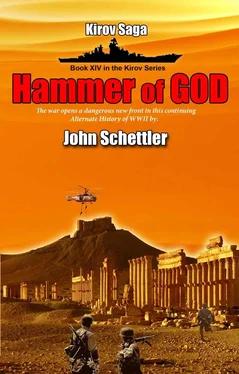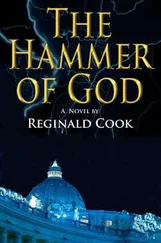John Schettler - Hammer of God
Здесь есть возможность читать онлайн «John Schettler - Hammer of God» весь текст электронной книги совершенно бесплатно (целиком полную версию без сокращений). В некоторых случаях можно слушать аудио, скачать через торрент в формате fb2 и присутствует краткое содержание. Жанр: Альтернативная история, на английском языке. Описание произведения, (предисловие) а так же отзывы посетителей доступны на портале библиотеки ЛибКат.
- Название:Hammer of God
- Автор:
- Жанр:
- Год:неизвестен
- ISBN:нет данных
- Рейтинг книги:4 / 5. Голосов: 1
-
Избранное:Добавить в избранное
- Отзывы:
-
Ваша оценка:
- 80
- 1
- 2
- 3
- 4
- 5
Hammer of God: краткое содержание, описание и аннотация
Предлагаем к чтению аннотацию, описание, краткое содержание или предисловие (зависит от того, что написал сам автор книги «Hammer of God»). Если вы не нашли необходимую информацию о книге — напишите в комментариях, мы постараемся отыскать её.
Hammer of God — читать онлайн бесплатно полную книгу (весь текст) целиком
Ниже представлен текст книги, разбитый по страницам. Система сохранения места последней прочитанной страницы, позволяет с удобством читать онлайн бесплатно книгу «Hammer of God», без необходимости каждый раз заново искать на чём Вы остановились. Поставьте закладку, и сможете в любой момент перейти на страницу, на которой закончили чтение.
Интервал:
Закладка:
Hitler’s eyes were a well of thought now, with a light slowly kindling there as these thoughts fed the fires of his determination. Manstein smiled, tucking his baton beneath his arm, the lesson in strategy now over. He left the Fuhrer with one last note of caution.
“This is a bold and imaginative plan,” he said. “It would augment the southern emphasis for Barbarossa very well. Yet would even this knock Great Britain out of the war? I do not believe so. It may knock them out of the Middle East, but they will continue to fight on. The British Empire would still have strong outposts in India and the far east. Taking Egypt would be a severe setback, but they will fight on no matter what, and wait for the Americans to get involved. Then we will be moving troops west again, because instead of us planning to invade England as we should have last year, they will be planning to invade French colonies in West Africa, or even France itself. You see, my Fuhrer, Ivan Volkov is not the only man who can make predictions.”
Chapter 5
They were some time discussing all the ramifications of what Fedorov had told them-that Ivan Volkov was not a man of their own world, but a dark angel from another. What he had whispered in Hitler’s ear, no man knew, but Fedorov stressed that, at key junctures in the war thus far, the Germans had taken decisions that they never made in the old history, and that they were slowly but surely leading them to victory. It was clear to all present that Volkov was now acting as a source of intelligence for Hitler and his regime, using his knowledge of future events to shape the present as best he could. It was therefore necessary for Fedorov to stand in opposition to Volkov, and be light where the other man cast his shadow.
He had discussed all this with Admiral Volsky and Kamenski before he was sent to this meeting, and they had expressed their confidence in his judgment.
“I can think of no other man with more respect for the history, Mister Fedorov, or so dedicated to preserving its integrity,” the Admiral had told him. “But realize that anything you reveal to the men of this era may have unforeseen consequences, no matter how well meaning your advice may be. You might warn them of operations doomed to failure, for example, like the ill fated landing at Dieppe by the Canadians. Yet that defeat taught the Allies valuable lessons that they put to good use at Normandy, and remember, we cannot foresee every possible outcome of these events, or of the changes we may cause here. That said, you must use your best judgment.”
So Fedorov was here, standing in this discussion with Generals and Admirals and heads of state that were glowing figures in the history he so loved, at once in awe of them, and amazed that he should have the temerity to speak as an equal.
Yes, he could not predict what might come of the decisions they would now make, but he had to try. Things had gone too far, and he and his ship were now too deeply enmeshed in the weave of this terrible tapestry of war. Now, with the arrival of Kinlan’s brigade, the necessity to act in a way that could guide the power they possessed was more essential than ever before. And so he made the difficult decision to use the knowledge he had, the store of all the many hours he had spent with his nose in the history books, come what may. He knew the campaigns that were now on the near horizon, and spent long hours reading from his library before he departed for this conference.
So they talked for many hours, deciding what must now be done to further their interests in this war. They spoke of Crete and Iraq and Syria, and the prospects ahead for them in the Western Desert. Where might Kinlan’s force be best employed? Should it remain together as one unit, or might it be better to saturate other British forces with a hard core of these resolute and terrible new warriors from the future. In the end, the need for secrecy guided their thinking as much as anything else, and for the moment it was decided that the Desert Rats would stay where they were, in the southern desert, the deadly foil on Rommel’s flank.
Yet the impending demands of those other battlefronts would delay any real British offensive against Rommel. The British needed time, and they had been given a brief measure of that in the victory lately won. Now they had to use that time to their best advantage. After the meeting it was Churchill who caught Fedorov’s elbow, asking if he might join Wavell for a quiet chat later that evening.
The darkness came, with stars crowding bright in the sky, and a crisp chill on the air. Fedorov was outside the mud walled meeting room, smelling the smoke from a wood fire and listening to the distant calls of wild things in the desert. The night seemed to weigh on him, a leaden feeling that darkened his mood with a sense of foreboding. The weight of all he had studied, and all he knew about what might happen next, was also heavy on his mind. And over it all hung the enormous girth of the war itself, a world war that was still in its adolescence in early 1941. It would go on for years, and so many would die before it ended.
He had read about them, from generals and statesmen, down to corporals in sergeants in small unit actions that were now lost in the stream of events. Yet for the men who fought them, they were the hard edge of life and death itself, moments of supreme personal effort, heroism and courage, cowering and fear, and all soiled with the soot of battle and blood. In those little lost actions of the war, groups of men, comrades all, struggled and fought for places that seemed insignificant in the general scheme of things-a bridge, a hill, an enemy redoubt that had to be taken by storm. They saw their friends die, lost brave officers, rose to the hour and did things they never thought they could, and all that remained of those desperate hours they fought was now but a few lines in an old history book. Yet here he was now, walking along those lines, seeing it all in the finest detail, smelling it, breathing it in…
That thought mated with the distinctive scent of tobacco, and he knew that someone had lit up a cigar. There was a movement behind him, and General Wavell came out from the sitting room to find him. He turned to see the tall, stalwart figure, weathered by the long years in Egypt, but still strong, his cap on, eyes catching the light of the stars.
“Captain Fedorov, would you care to join us now?” Wavell said in perfect Russian.
“Certainly, “ said Fedorov, and he followed the General past the two standing guards and into the shadowed room beyond. There he was thrilled to see one of the great pillars of the war years, one of the truly great men the century had given birth to, Churchill himself, sitting quietly in an chair by the fireplace with a brandy in one hand and a cigar in the other. Fedorov soon found himself under the heavy gaze of the Prime Minister, and he had an inner sense of dread as to what he might now be asked.
“You are a remarkable young man, Captain,” Churchill began, as Wavell translated. “I listened to you very closely in the general meeting, and I can see that your grasp of the situation here is secure.”
“It may seem that way,” said Fedorov, “but nothing is ever certain, Mister Prime Minister.”
“Very true, but yet you have had a peek around the corner of tomorrow, young man, and that is something that few, if any, can claim with any hope to be taken as a sane man. That, plus the fact that you seem intimately acquainted with the events now unfolding, make you a most remarkable asset. I hope you do understand that. And here you have come to us like a guardian angel, and I am told that in your day, our two nations were adversaries. To see you here now, and realize you have taken it upon yourself to try and reverse that outcome, is most commendable. With the knowledge you have of days to come, we can stand advised of every crooked jab of the enemy’s lance, and know when we must thrust and where to parry.”
Читать дальшеИнтервал:
Закладка:
Похожие книги на «Hammer of God»
Представляем Вашему вниманию похожие книги на «Hammer of God» списком для выбора. Мы отобрали схожую по названию и смыслу литературу в надежде предоставить читателям больше вариантов отыскать новые, интересные, ещё непрочитанные произведения.
Обсуждение, отзывы о книге «Hammer of God» и просто собственные мнения читателей. Оставьте ваши комментарии, напишите, что Вы думаете о произведении, его смысле или главных героях. Укажите что конкретно понравилось, а что нет, и почему Вы так считаете.












